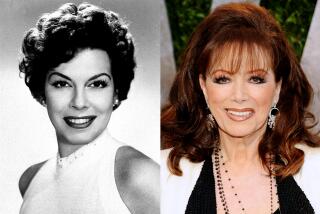Joanna’s Husband and David’s Wife by Elizabeth Forsythe Hailey (Delacorte: $17.95; 328 pp.)
- Share via
When Elizabeth Forsythe Hailey’s best-selling first novel, “A Woman of Independent Means” was published, I sent my mother and aunt each a copy. One of them wrote back, “What a selfish woman!” the other, “How smart and strong she was!” This same aim on the part of the author--very recognizable and real behavior presented so that it can be taken either as good or bad on the part of the reader--forms the basis of Hailey’s new novel, “Joanna’s Husband and David’s Wife.” The structure of the novels is similar as well, in that the earlier book consisted entirely of letters and the present one, of journal entries.
The novel begins when Joanna leaves her diary out for her college-age daughter to read, conveying it with a cover letter in which it is unclear whether the mother is dead or only gone. Then, a letter from the girl’s father, David, informs us that he, also reading the journal for the first time, is going to fill in his side of the same 25-year span, speaking in his own defense.
The idea is intriguing, and the flow of events pleasantly familiar for many of us who were there: marrying in the ‘50s, having babies, being only wife and mother, making a late start in our careers, then seeing that career become the first order of business. Many nostalgic touches are recalled: 1964, the year of the pastel spring coat (Joanna’s was pale pink; mine was baby blue), the circle pin, the pillbox hat, the passionate pursuit of his career, the preoccupation with meals and problems with sex. Jealousy on both sides; communication on neither. Then, here in their story, the day comes when she, having written a best seller, stops being only “David’s wife,” and he, a failed playwright, has to deal, turnabout, with how it feels to be known as “Joanna’s husband.”
The problem is, we do not really get two sides of the story. In “A Woman of Independent Means,” the reader got, implicitly, the concurrent reaction of other family members. Here, Joanna’s entries are long, filled with the perspective and emotion of the time--we get to know her; we share in her growing up--but David’s are not. His entries, all recorded in the present, are at best amendments, more often, merely retorts.
For example, in 1961, Joanna, working full time while he is in graduate school, writes about the problem of working and running a house.
“David and I are so different. He abhors routine--and goes out of his way to avoid doing anything exactly the way he did it the day before. Often I’ll have dinner in the oven and he’ll come home from class in the mood for a movie. The first time it happened, I made the mistake of saying we had to eat dinner first, but David told me to stop acting like his mother.
“Now I’ve learned to take whatever I have in the oven and put it in the refrigerator overnight. Dinner, like almost everything, can be put on hold for twenty-four hours with no ill effect.”
To which David, in 1984, adds only, “Why do I think that’s some kind of sexual crack?”
The result is that instead of seeing the same span of years from two different points of view, we are left with a great deal of information about her, her children, her work, and a sketchy impression of him, mostly as an emotionally controlling and parsimonious cad. I mean, OK, we can believe (I think) that he throws all the pages of her first draft into the bathtub, and she sticks around. But when he opens all her professional mail without her knowledge and answers it for her? Or when he blacks out all the sexual entries in her portion of the journal because, he tells his daughter, he finds them offensive? Where is the account of how it felt to him at the time? Where did all his account of how it felt to him at the time? Where did all his anger come from?
It might have worked better, been fairer to reader (and daughter) if both Joanna and David had kept separate diaries at the same time. Such parity of space and experience might have given us, if not “Rashomon,” at least a good college debate.
Obviously such desire to restructure the basic idea of “Joanna’s Husband and David’s Wife” implies that the novel is worth the effort, and I think it is. I read it nonstop, and many times found myself nodding in recognition. At the end, it achieved at least part of its goal: I was reminded how selfish we often were in those days, yet how strong we had become.
More to Read
Sign up for our Book Club newsletter
Get the latest news, events and more from the Los Angeles Times Book Club, and help us get L.A. reading and talking.
You may occasionally receive promotional content from the Los Angeles Times.










